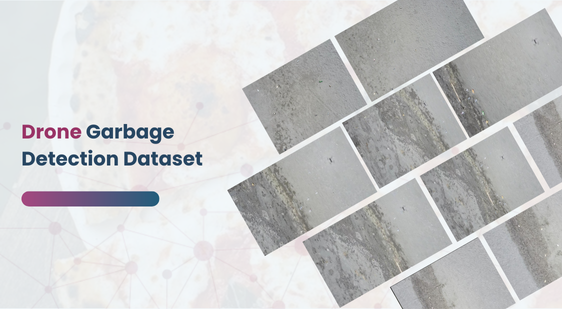Drone Garbage Detection Dataset
Home » Dataset Download » Drone Garbage Detection Dataset
Drone Garbage Detection Dataset
Datasets
Drone Garbage Detection Dataset
File
Drone Garbage Detection Dataset
Use Case
Drone Garbage Detection Dataset
Description
Explore the Drone Garbage Detection Dataset designed for waste classification and environmental monitoring. Train machine learning models using drone-captured images of various waste types like plastic, glass, and aluminum.

Description:
This comprehensive dataset is designed for the classification, detection, and analysis of waste materials found in coastal areas, specifically for environmental monitoring and recycling efforts. It contains drone-captured images of various waste types scattered on beaches, making it an invaluable resource for training machine learning models. The dataset is structured to seamlessly integrate with the YOLOv8 object detection model.
Download Dataset
Key Applications
- Recycling Automation: The dataset supports the development of systems that can automate the sorting of recyclable waste materials, significantly reducing manual labor and enhancing recycling efforts.
- Environmental Monitoring: The drone-captured images provide real-time data that can be used for monitoring pollution levels in coastal areas, helping organizations to track waste accumulation and its environmental impact.
- Sustainability Research: With detailed waste categorization, researchers can use this dataset to analyze trends in waste generation, informing future waste management strategies.
Dataset Structure
The dataset is divided into three key subsets:
- Training Set: Includes the majority of the images, used to train machine learning models.
- Testing Set: Reserved for testing the trained models to assess performance.
- Validation Set: Used for fine-tuning models and preventing overfitting during training.
Image and Annotation Details
- Format: All images are in JPEG format for easy integration with image-processing libraries.
- Resolution: The images are high-resolution, allowing for detailed object detection.
- Annotation: Each image comes with corresponding labels that define the waste category, making it suitable for object detection models.
- Naming Convention: The image file names follow a structured format, indicating the source video and frame number from which they were extracted. This allows users to easily trace the original context of the waste material captured by the drone.
Conclusion
This drone garbage detection dataset is a valuable resource for both AI researchers and environmental scientists. By enabling accurate waste classification and trend analysis, it paves the way for better waste management strategies and contributes to global sustainability efforts.
Contact Us

Quality Data Creation

Guaranteed TAT

ISO 9001:2015, ISO/IEC 27001:2013 Certified

HIPAA Compliance

GDPR Compliance

Compliance and Security
Let's Discuss your Data collection Requirement With Us
To get a detailed estimation of requirements please reach us.
